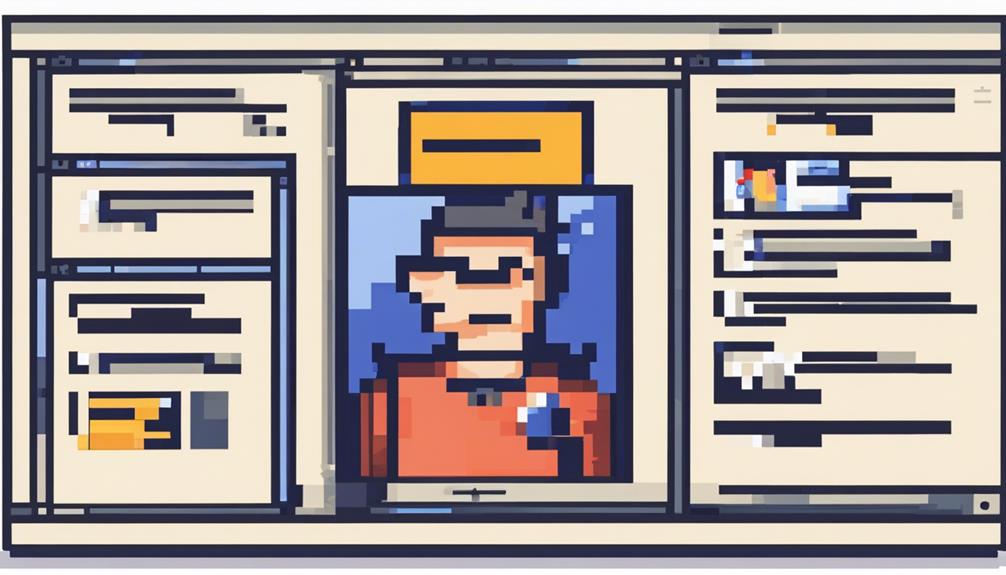Protect your Facebook account with these key steps: Use a strong password with a mix of characters, activate two-factor authentication, manage permissions carefully, steer clear of suspicious links, set trusted contacts for account recovery, and adjust privacy settings diligently for control. These actions bolster your account's security against potential hackers.
Key Takeaways
- Create a strong, unique password with letters, numbers, and special characters.
- Enable two-factor authentication (2FA) for added security.
- Review and manage permissions and roles carefully.
- Avoid clicking on suspicious links to prevent hacking attempts.
- Set up trusted contacts for account recovery assistance.
Strong Password and 2FA
Creating a strong password and implementing two-factor authentication (2FA) are essential steps in fortifying your Facebook account against potential hackers. Your Facebook account holds personal information, making it important to secure it with a strong, unique password. Avoid using common phrases or personal details in your password to prevent easy hacking attempts.
A strong password should include a mix of letters, numbers, and special characters. Additionally, enable two-factor authentication for an extra layer of security. 2FA requires a second form of verification, such as a code sent to your phone, for login.
Regularly updating your password and considering the use of a password manager can further enhance the security of your account. By incorporating these measures, you significantly reduce the risk of unauthorized access to your Facebook account, safeguarding your personal information from potential threats.
Review Permissions and Roles

Understanding and managing the roles and permissions associated with your Facebook Page is vital for maintaining security and control over your account. Different roles like Admin, Editor, Moderator, and Analyst have varying levels of access, so it's important to review and update admin access settings regularly.
By ensuring that the right individuals have the necessary permissions, you can prevent unauthorized actions and breaches. Adding multiple admins as backups can be helpful in emergencies or team changes.
When granting permissions in Business Manager, exercise caution as these decisions can impact the overall control and security of your Page. Only trusted individuals should have access to your Facebook Pages to reduce the risk of security incidents.
Avoid Suspicious Links

When browsing on Facebook, users should exercise caution to avoid clicking on suspicious links that could compromise their account security. These links often come from unverified sources and may lead to phishing attempts, where hackers try to steal your login information.
One way to confirm a link is by checking the URL to make sure it directs to a legitimate Facebook page. It is important to refrain from clicking on links in unsolicited emails or messages, especially those requesting your login details.
Clicking on suspicious links can result in malware installation on your device, putting your account security at risk. If you are unsure about a link's legitimacy, it is safer to type the Facebook URL directly into your browser rather than risking your account by clicking on potentially harmful links.
Set Up Trusted Contacts

To bolster the security of your Facebook account, consider setting up trusted contacts who can assist you in regaining access if needed. By selecting 3 to 5 friends as trusted contacts, you add an extra layer of security to your account.
These trusted contacts can help you recover your account if you ever find yourself locked out by sending you a special URL. To set up trusted contacts, navigate to the Security and Login section of your Facebook settings.
When choosing your trusted contacts, make sure to select friends whom you trust and who can assist you in emergencies. This added security feature guarantees that you have a backup plan in place to regain access to your account promptly.
Utilize the option of trusted contacts on Facebook to enhance the overall security of your account and provide peace of mind knowing you have a reliable way to recover your account if necessary.
Adjust Privacy Settings

How can you enhance the security of your Facebook account to safeguard your personal information and posts effectively?
By adjusting your privacy settings, you can control who sees your content and personal details. Utilize the Audience Selector tool to customize privacy settings for specific audiences, ensuring that only trusted individuals have access to your information.
It's important to be cautious when sharing personal details on the platform to protect your privacy and security. Regularly reviewing and managing your privacy settings is vital to maintain control over your interactions on Facebook.
Frequently Asked Questions
What Is the First Thing You Do When You Get Hacked on Facebook?
When faced with a Facebook hack, the initial step is to attempt account recovery through the 'Forgot Password' feature. If unsuccessful, promptly report the incident via Facebook's 'Hacked Accounts' section and secure linked accounts.
How Do I Safeguard Myself on Facebook?
To safeguard yourself on Facebook, prioritize using a unique and strong password, enable two-factor authentication, regularly review privacy settings, avoid suspicious links, and verify messages to prevent hacking attempts and protect your personal information.
How Do I Ensure Safety on Facebook?
To guarantee safety on Facebook, implement strong, unique passwords, activate two-factor authentication, review privacy settings regularly, avoid clicking suspicious links, and be wary of phishing attempts. These steps collectively enhance security and safeguard your account against potential hackers.
How Do Hackers Get Into My Facebook Account?
Hackers can infiltrate Facebook accounts through various methods like phishing, weak passwords, malware, compromised networks, and social engineering. Being cautious of suspicious activities, using strong unique passwords, enabling two-factor authentication, and monitoring account access can enhance security.
Conclusion
In summary, safeguarding your Facebook account from hackers is essential. By following key tips such as using a strong password and enabling 2FA, reviewing permissions, avoiding suspicious links, setting up trusted contacts, and adjusting privacy settings, you can greatly reduce the risk of unauthorized access.
Stay proactive and vigilant in protecting your online presence to guarantee a safe and secure experience on social media platforms.
Stay safe, stay secure, stay informed.









